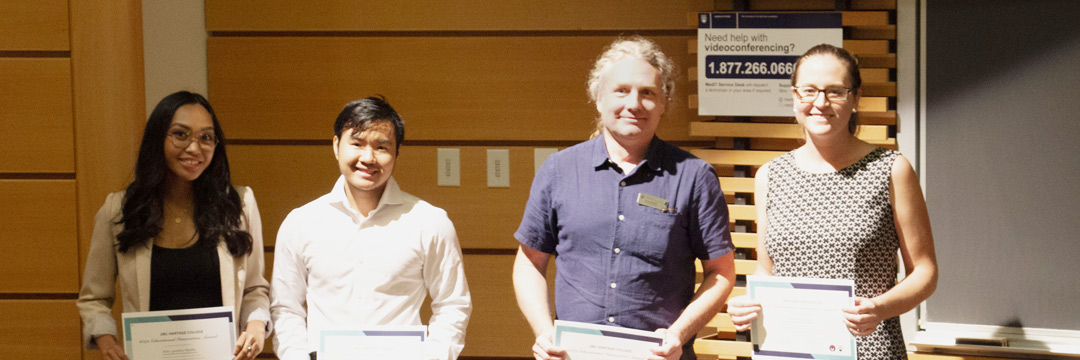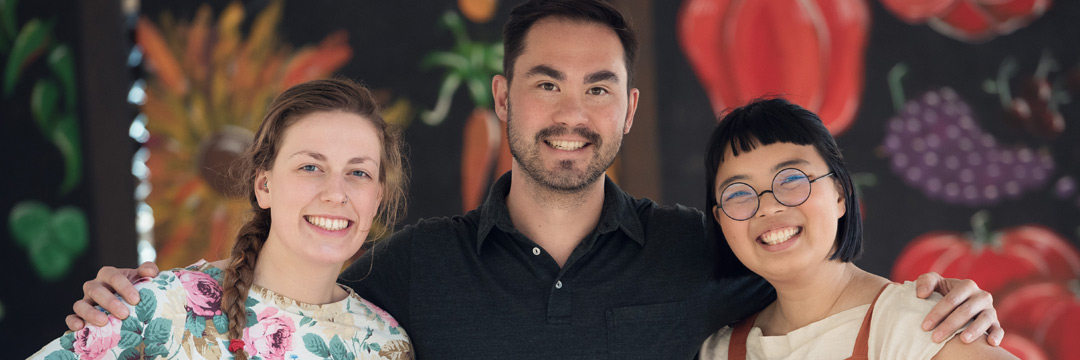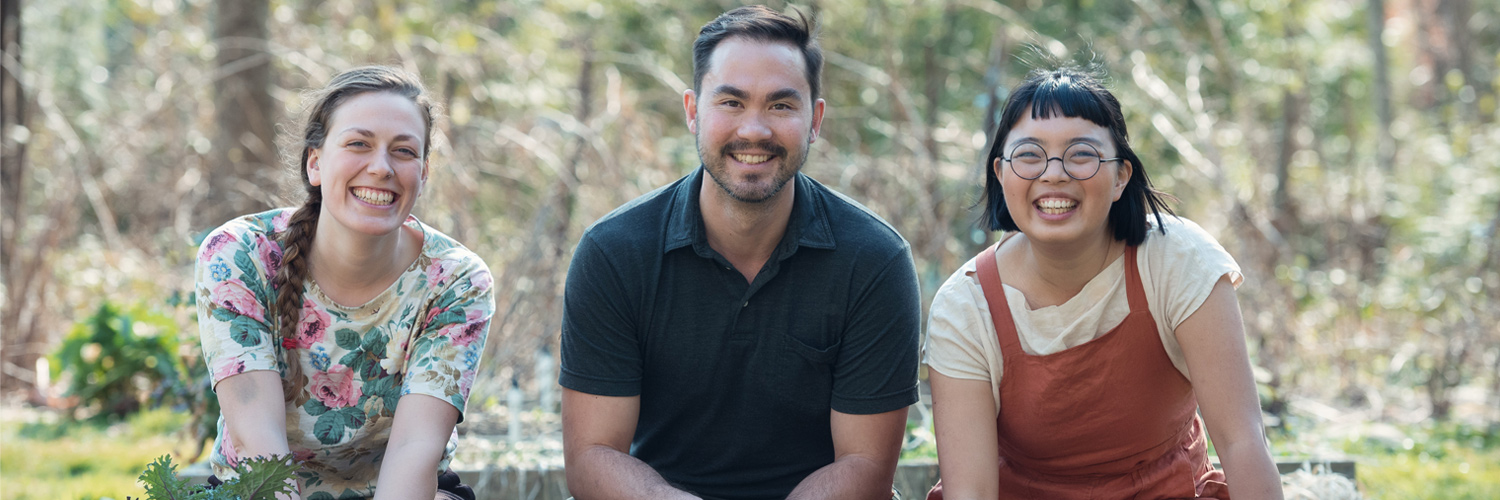Across the university, hundreds of innovative educational projects are underway, all working to enhance learning at UBC—and students are contributing to every part of the process.
These projects are funded through the Teaching and Learning Enhancement Fund (TLEF), a program that supports innovative educational enhancements. Since its creation in 1991, the TLEF has funded more than 1,000 innovative projects that have enriched the student learning experience.
The TLEF is financed entirely by a portion of student tuition, and students are involved in all aspects, from sitting on the Adjudication Committee to developing, implementing and evaluating these projects.
For the 2019/20 funding round, 236 students will be hired to work on TLEF project teams. More than $1 million of TLEF funding will be spent hiring students in roles such as teaching assistants, research or academic assistants, co-op students and Work Learn students.
The TLEF is one way that UBC is engaging students as partners to enhance teaching and learning. This form of student engagement emphasizes involving students in every stage of collaboration, from planning an idea to evaluating its outcomes. In this process, students are equal and valuable team members, contributing their unique knowledge and expertise to shape a project.
From bringing their skills and perspectives as key members of project teams to championing their own ideas, students are actively participating across the TLEF process.

Kim Lynette Abella, Liam Su, Brian Wilson & Katherine Lyon. Photo Credit: Vantage College
Augmenting learning through a digital walking tour
Kim Lynette Abella and Liam Su, two recent graduates in the Department of Sociology, have been working on an augmented reality walking tour that will take students across Vancouver neighbourhoods. The two are part of an undergraduate research assistant team who are collaborating with faculty members to create a blended, location-based learning experience for students.
Using a mobile device, students will be able to download the free walking tours created through Motive.io. The tours, which address issues of social change and spatial inequality, will lead students to specific GPS points, where they will listen to interviews with community members and watch video footage of events that occurred at that spot. Students will also locate digital objects superimposed onto the field and engage in role-taking to appreciate different perspectives. The tours will be used in SOCI 102: Inequality and Social Change and GEOG 122: Geography, Modernity and Globalization.
Katherine Lyon, an instructor in the Department of Sociology and the Vantage One Arts program, is developing the tours in collaboration with Siobhán McPhee, a senior instructor in the Department of Geography, and Brian Wilson, curriculum manager for Vantage College. The project builds on McPhee’s earlier work with geospatial learning.
The sociology tour will explore social change and social movements through the Trans Mountain Expansion Project, the Women’s Memorial March and the Pride Parade. Students will experience the events through the different perspectives of a protestor, member of media and law enforcement official.
“These walking tours engage students by giving them a chance to learn in a way that isn’t in a traditional setting,” Su says. “It gets you to go to a location to really visualize yourself in the moment. I think it’s very immersive.”
For Abella and Su, one of the most challenging and interesting tasks has been getting in touch with local community members to share their stories.
“We want to have people represent their perspectives authentically and be in control of their own narrative,” Abella says. “There are a lot of different perspectives and complexities that are involved.”
Lyon credits the students for bringing their unique outlook to every step of this project.
“From the beginning, students have been integral to the development of the whole project,” Lyon says. “We had students involved in the writing of the TLEF proposal itself. The idea for more field experiences came from feedback from students about how they learn best.”
The research assistant team have created content for the tour, collected data and information, and filmed and edited materials. Another group of students are involved in beta testing the tour.
“I might navigate the neighborhood or the city differently than undergraduate students do,” Lyon says. “Getting different perspectives on what places are important really shaped how the tour is laid out.”
This is one of the first experiences where Abella and Su have collaborated with an instructor outside of a classroom setting. They appreciate the autonomy they have over their work.
“We’re able to share ideas freely and work on problems together,” Abella says. “I think that all our ideas usually mesh together pretty well. I don’t feel like there’s a hierarchy.”
“For experimental pedagogical projects like this TLEF,” Lyon adds, “it’s essential to have student insight into not just what they’re learning, but the mediums through which they’re learning.”
The walking tour, which recently received the Vantage College Educational Innovation Award, will be tested this fall and launched to students in January 2020. They then hope to make versions of the tour available to educators across campus.

Meryn Corkery, Colin Dring & Joyce Liao. Photo Credit: UBC Faculty of Land and Food Systems
Addressing issues of equity in food systems
Across campus, Meryn Corkery and Joyce Liao, both entering their fifth year in the Global Resource Systems program in the Faculty of Land and Food Systems, are spearheading their own TLEF project together with PhD candidate Colin Dring. The three are creating open access teaching and learning resources on food justice, exploring how oppressions manifest in the food systems through an intersectional lens.
Corkery and Liao developed the idea after completing LFS 350, a course in the Faculty’s core curriculum. The course left them curious about issues of equity and eager to learn more. The team first looked at how different courses across Canada and the United States are teaching food justice. From that research, they are now building their own learning modules, which will be tested this fall in their Student Directed Seminar, LFS 490: Food Justice – Eating Our Way Towards Equity. They have been working on creating a syllabus, planning lessons and designing learning activities.
“It was really inspiring for us to see the work that different professors are doing,” Corkery says. “We’re trying to make something that hopefully they will be able to use in their course or that furthers the community of practice that’s starting to develop around food justice education.”
Will Valley, a senior instructor in the Faculty of Land and Food Systems and the academic director of the Land, Food and Community series, supported Corkery, Liao and Dring in their student-led TLEF application. Valley, now the project’s principal investigator, sees the project creating an essential bridge between social issues and science education.
“So many of the challenges our students will be facing once they graduate aren’t just issues of making a better food system—they’re issues of making a better society,” Valley says.
Valley is excited for the students to transition from learner to teacher. “When we support students to be on the other side, I think that’s when they learn a whole new way of learning,” Valley says, noting that the process of teaching can often help students become more effective learners.
As Corkery and Liao near graduation, they hope to pass the project onto their peers.
“We’re really hoping the learning modules live on, well beyond the time that we’re working on this project,” Liao says. “To know that future students will have a better grasp on things that I was questioning throughout my undergrad, I think that would be pretty cool to see.”
The learning modules will be further tested in LFS 350 in January 2020. They hope to get the modules online and accessible to everyone within the next year.
“We’ve built in an open source, open access mentality to our learning modules,” Dring says. “That’s the piece I’m most excited about—not just what we’re doing here at UBC but its potential to influence and inspire others elsewhere.”
A space to collaborate
For these students, their time working on a TLEF project has given them valuable work experience, a chance to partner with faculty and staff, and the opportunity to directly contribute to the learning experience of students across UBC.
“I think it’s a really neat way for us to be wrapping up our degrees,” Liao says. “We’ve learned so much from being in the faculty, and this is how we’re giving back to it.”
Through the TLEF process, these two project teams—along with project teams across campus working on other innovative ideas—are forging meaningful partnerships between students, faculty members and staff to transform education at the university.
“It’s really nice that UBC has these opportunities,” Valley says. “The TLEF is such a unique space for all the stakeholders at UBC to come together.”
UBC faculty, staff and students across all Faculties and Colleges can apply for funding of up to $50,000 for Small TLEF Innovation projects and $250,000 for Large TLEF Transformation projects.
Applications for the 2020/21 Teaching and Learning Enhancement Fund are now open.
References and resources
- 2019 TLEF Showcase poster
- Cook-Sather, A., Bovill, C., & Felten, P. (2014). Engaging students as partners in learning and teaching: a guide for faculty. San Francisco: Jossey-Bass.
- Verwoord, R. (2016). Engaging students as partners in learning and teaching: a guide for faculty [Review]. International Journal for Academic Development, 21(1), 86-89.
- Healy, M., Flint, A., & Harrington, K. (2014.) Engagement through partnership: students as partners in learning and teaching in higher education. The Higher Education Academy.
- McMaster University Student Partners Program
- Mercer-Mapstone, L., & Marie, J. (2019). Practical Guide: scaling up student-staff partnership in higher education. Institute for Academic Development: University of Edinburgh.
- Smith, H., Verwoord, R., Yahlnaaw, & Veitch, C. (2019). P.O.W.E.R. – A Reflective Framework for Students-as-Partners Practices and Processes.
